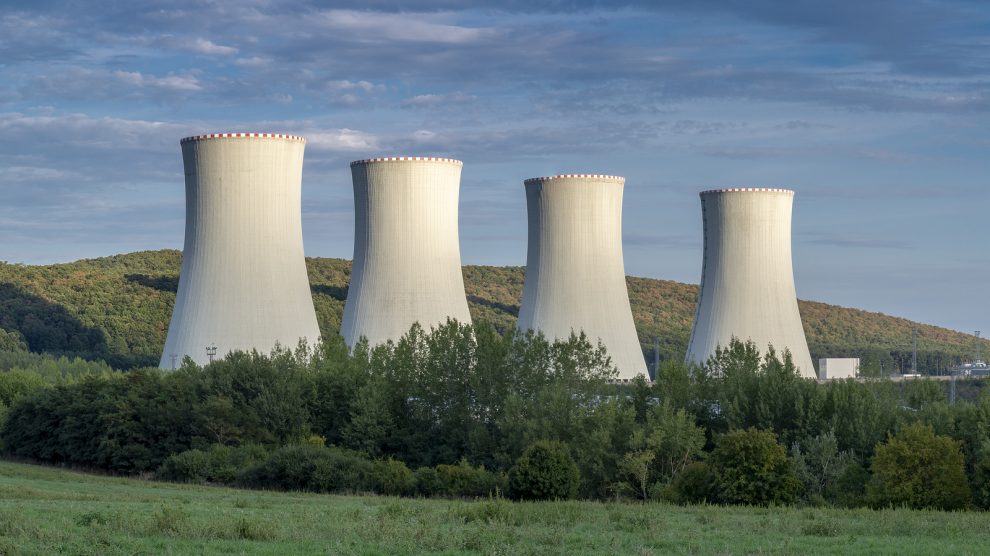Hungary excepted, Central and Eastern Europe is eager to end its reliance on Russia for nuclear fuel and technology.
Rosatom, Russia’s state-owned nuclear energy company, is one of few Russian companies still legally operating in the European Union. This is despite the fact that in January 2023, news broke that Ukrainian intelligence had uncovered documents proving Rosatom had planned to export sanctioned goods to the Russian military.
Using its legal operations in the EU, the company can provide Russia’s arms industry with much needed technology and fuel.
- What future for the Ukrainian energy sector?
- Poland signs nuclear deals, but concerns over slow pace of coal exit remain
- Hot and cold: The risks posed by mines at Zaporizhzhia nuclear power plant
Ukrainian officials have been urging the EU to put Rosatom on its sanctions list for more than a year, especially after the company was incriminated in Russia’s seizure of the Zaporizhzhia power plant.
Many within the EU agree. Following a visit to Kyiv in April, German Economy Minister Robert Habeck urged the EU to impose sanctions on Russian nuclear fuel “even if that means a change for the countries that still equip nuclear power plants with Russian uranium”.
The Bellona Foundation, an international environmental NGO based in Norway, earlier this year published a major report looking at Rosatom’s role in Russia’s invasion of Ukraine.
“It is not surprising that a corporation as politically important as Rosatom would be deeply enmeshed in Moscow’s war effort. What is surprising is how reluctant the West has been to place Rosatom on the same footing as other Russian energy giants that have been the target of sanctions and other forms of political redress from governments supportive of Ukraine,” wrote its author, Charles Digges.
Supply and demand
Efforts to decouple the EU from Russian nuclear fuel have stalled in large part over supply concerns. Unlike gas or oil, nuclear energy imports are hard to replace. Regardless, European states will have to detach themselves from Russian nuclear supplies in the long-term if they wish to free their markets from Russian influence.
Russia produces eight per cent of the world’s raw uranium supply and 38 per cent of converted uranium. Additionally, Russia is also home to around 46 per cent of the world’s uranium enrichment capacity.
The EU, in turn, sources 20 per cent of its natural uranium from Russia along with 26 per cent of its enrichment services, according to data from the World Nuclear Association.
The are 18 nuclear power plants in the EU which use Russian designs and rely on Russian imports. All of these would be affected by EU sanctions on Rosatom unless they can source new suppliers.
Slovakia last week became the latest country to do just that. On August 25, US energy firm Westinghouse agreed to supply nuclear fuel to Slovenské elektrárne, whose four operational nuclear reactors provide Slovakia with almost 60 per cent of its electricity.
According to Branislav Strýček, director of Slovenské elektrárne, “Securing another nuclear fuel supplier for our power plants is an important step in strengthening Slovakia’s energy security. Nuclear power plants represent an important pillar in our country’s energy mix, therefore I consider it to be crucial to secure nuclear fuel supply diversification for their stable operation.”
Westinghouse is the only fully-Western supplier of fuel for the Russian-built VVER type reactors used in Slovakia. The firm has also signed deals to supply Bulgaria and Czechia with fuel for their nuclear reactors, as emerging Europe looks to speed up its move away from Russia.
Except, that is, Hungary, which appears to be in no hurry to end its nuclear relationship Russia. In August 2022, the government in Budapest issued Rosatom a permit to construct two new reactors at its Paks Nuclear Power Plant, making it highly probable that Hungary would block any new attempt to sanction Rosatom.
Atomstroyexport, a subsidiary of Rosatom, commenced main-stage construction of the two VVER power units at Paks earlier this month.

The opportunities are there
Westinghouse’s role in emerging Europe’s nuclear power industry is not limited to the supply of fuel. In October 2022 the firm inked an agreement with Poland—which currently lacks a nuclear power plant—to build three reactors at Choczewo near the Baltic Sea.
Poland has also reached an agreement with Korea Hydro and Nuclear Power (KHNP) to assess the viability of building four nuclear reactors in Pątnów, using South Korean technology. It is a further example of the opportunities now open to nuclear energy firms in emerging Europe as the region shifts away from Russia and Rosatom.
Other countries, including Romania, are meanwhile looking at US-developed small modular reactors (SMRs) to boost their nuclear power sectors.
Westinghouse is also likely to be decisive in Ukraine’s future energy strategy. Indeed, Ukraine has been cooperating with the firm for several years, buying fuel for its current reactors.
In January, the relationship was taken a step further when the government in Kyiv adopted a decree that could see the construction of two Westinghouse-built nuclear reactors in Ukraine, at the Khmelnytskyi nuclear power plant.
Ukraine’s Energy Minister Herman Galushchenko said the deal marked “the end of the era of nuclear generation based on Soviet technology.”
Like Romania, Ukraine is also exploring the potential of SMRs.
Photo: Slovakia’s Mochovce Nuclear Power Plant.
Unlike many news and information platforms, Emerging Europe is free to read, and always will be. There is no paywall here. We are independent, not affiliated with nor representing any political party or business organisation. We want the very best for emerging Europe, nothing more, nothing less. Your support will help us continue to spread the word about this amazing region.
You can contribute here. Thank you.







Add Comment